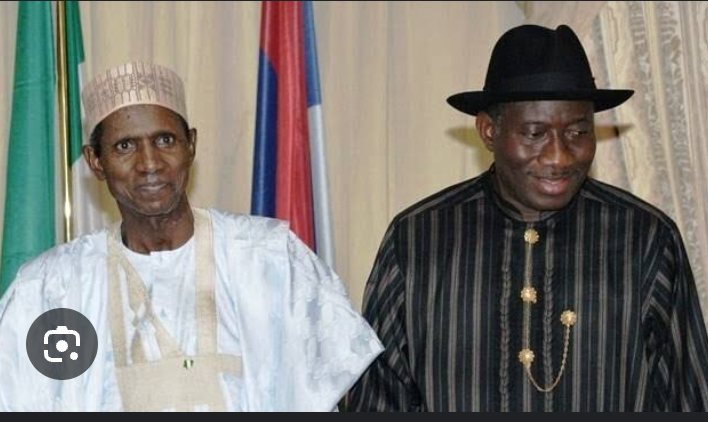
“A Legacy That Still Breathes”: Goodluck Jonathan Pays Emotional Tribute to Yar’Adua 15 Years After His Death

Fifteen years may seem like a long time, but for former President Goodluck Jonathan, the memory of his late friend, boss, and fellow statesman Umaru Musa Yar’Adua remains as vivid and powerful as ever. In a touching and deeply reflective tribute shared via his official platforms, Jonathan commemorated the 15th anniversary of Yar’Adua’s passing with words that stirred emotions across the nation and reignited conversations about what true leadership means in Nigeria’s complex political landscape.
On May 5, 2010, the nation lost one of its most respected and admired leaders. Umaru Musa Yar’Adua, Nigeria’s 13th President, passed away while still in office, leaving behind a legacy that was as short-lived as it was impactful. Today, as the country reflects on the passage of time since that monumental loss, Jonathan’s heartfelt words have brought back a flood of memories and sentiments from citizens, politicians, and civil society alike.
“In memory of President Umaru Musa Yar’Adua: 15 years after,” Jonathan began his tribute, setting a somber but proud tone. “Fifteen years ago, our nation lost a patriot. A servant leader with whom I shared a common vision for a united, inclusive and just nation.” That opening line alone carried the weight of years of governance, partnership, and shared dreams between two men who once stood side by side in Nigeria’s highest office.
Jonathan’s tribute did more than merely honor Yar’Adua—it painted a picture of a man whose every decision was motivated by principle, fairness, and a deep love for his country. “President Yar’Adua’s life was defined by service and selflessness,” he wrote. “His account of stewardship, whether as a teacher, governor or president, was guided by hard work, patriotism, accountability, commitment to justice and adherence to the rule of law.”
In an era where citizens often voice disillusionment with leadership, the late president’s name continues to evoke admiration. Yar’Adua’s legacy, which includes landmark reforms such as the Niger Delta Amnesty Program and a reputation for transparency, has stood the test of time. Many recall how he publicly declared his assets upon assuming office—a rare act among Nigeria’s political elite. Others remember his bold moves to restructure the energy sector and improve the electoral process. Though his time in office was cut short by illness and ultimately death, Yar’Adua’s policies laid foundations that some argue are still relevant today.
Goodluck Jonathan’s message was not just one of remembrance but also a subtle reminder of what the standard for leadership should be. He spoke of Yar’Adua’s “burden of reconciling our people, fostering unity and mobilising citizens across the land towards building a nation of justice, peace and progress.” These words, while reflective, also resonate with the current climate in Nigeria—one marked by divisions, economic challenges, and a citizenry crying out for visionary leadership.
“His tenure, although short, was impactful and progressive, a moment we remember for selfless service and deep commitment to the public good,” Jonathan wrote. And in those words lies perhaps the most compelling aspect of Yar’Adua’s story: that leadership, even when brief, can leave a lasting imprint when rooted in integrity and humility.
The former president didn’t just speak as a political figure—he spoke as someone who knew Yar’Adua intimately, as a friend and colleague. “Today, I celebrate my friend, brother and boss,” he wrote with visible affection, “for his exemplary and sacrificial life of service, his genuine efforts in nation building, and his dedication to fostering an inclusive democracy anchored on justice, equity and national unity.”
The emotional weight of Jonathan’s tribute has struck a chord across Nigeria. Social media platforms have been flooded with messages echoing his sentiments. The hashtag #15YearsAfterYarAdua began trending within hours, as Nigerians from all walks of life posted their own memories and reflections. Many called for today’s leaders to study Yar’Adua’s approach to governance, which they describe as humble, transparent, and centered on the people.
Public figures and analysts have also joined the chorus of praise. Several lawmakers paid homage on the Senate floor, recounting Yar’Adua’s efforts to modernize Nigeria’s institutions and approach issues of national unity with diplomacy. Even critics from his time in office now acknowledge that his intentions were rooted in what was best for Nigeria, even if he didn’t have the time to bring all his plans to fruition.
But beyond politics, Yar’Adua’s death and Jonathan’s tribute highlight the power of legacy. In a region often plagued by political infighting and short-term gains, remembering a leader who exemplified discipline and empathy offers a rare moment of unity. The tribute is not just about mourning the past—it’s a call to action for the future. It asks those in power, and those aspiring to power, to consider what kind of legacy they wish to leave behind.
As Jonathan’s words continue to echo across the nation, Nigerians are reminded that good governance is not about how long one stays in office, but about the depth of impact one makes while there. Umaru Musa Yar’Adua may have passed fifteen years ago, but his spirit clearly lives on—not only in the decisions he made, but also in the leaders he inspired and the people he served.
In a time of great uncertainty and political transition, Jonathan’s tribute is more than just a message to the past; it is a challenge to the present. It asks leaders and citizens alike to remember what true leadership looks like—to honor it, to learn from it, and perhaps most importantly, to replicate it.
Fifteen years after his passing, Yar’Adua’s name still stands tall. And thanks to Goodluck Jonathan’s moving tribute, the story of a quiet, humble leader who chose principle over politics has once again captured the nation’s heart. A leader may die, but a legacy—when it is truly built on service and sacrifice—lives forever.


